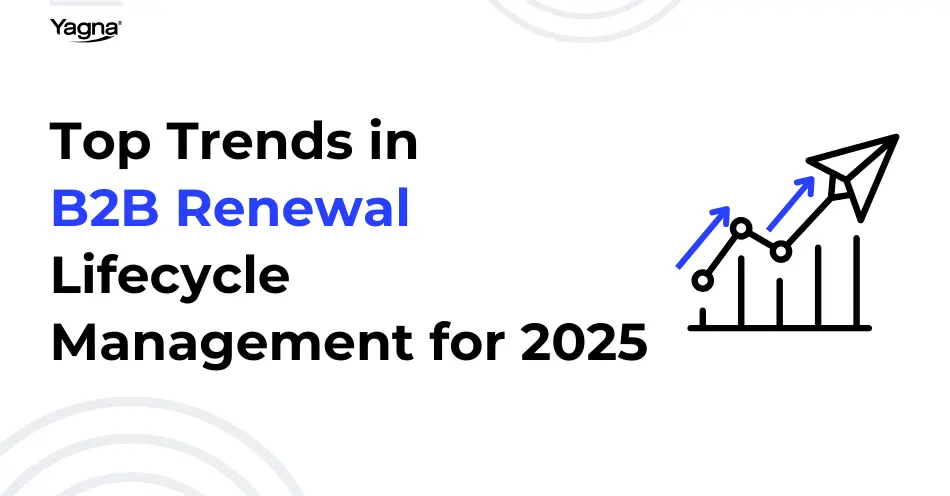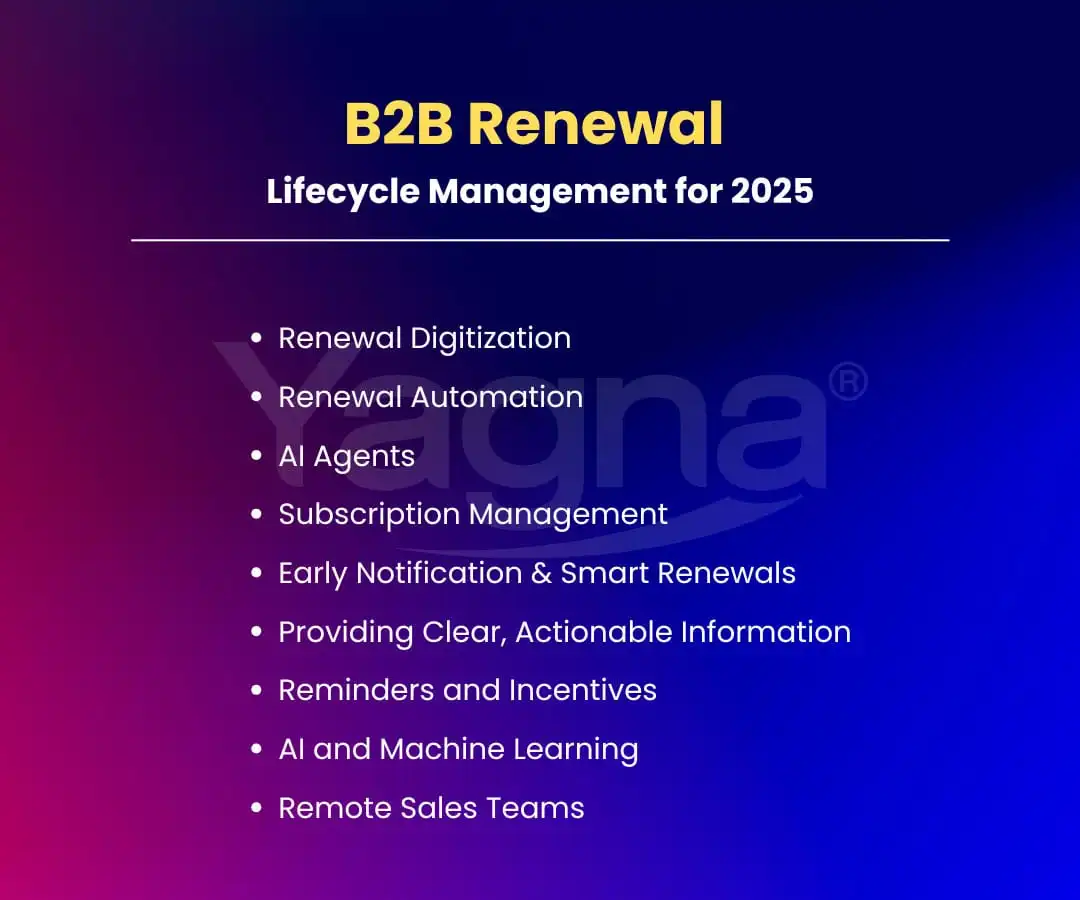
Top Trends in B2B Renewal Lifecycle Management for 2025
B2B renewal management is evolving faster than ever.
With businesses prioritizing efficiency, customer retention, and revenue growth, new trends are shaping the future of B2B renewals. Companies that adapt to these innovations will stay ahead of the curve, while those that don’t risk falling behind.
Let’s dive into the key trends redefining B2B renewal management in 2025.

1. Renewal Digitization: The Foundation of Seamless Renewals
Digitization is no longer optional—it’s a necessity. Businesses are embracing digital platforms to manage renewals efficiently, replacing spreadsheets and manual tracking with automated solutions.
How Digitization Transforms Renewals:
- Predictive Analytics: Identify renewal risks early and take proactive action.
- Efficiency Boost: Reduce manual work and free up teams for strategic initiatives.
- Personalized Engagement: Use automation to send customized reminders and renewal offers.
2. Renewal Automation: Streamlining the Entire Process
Automation is taking renewal management to the next level. From tracking contract expirations to sending renewal quotes and follow-ups, businesses are automating the entire process to improve efficiency and accuracy.
Benefits of Renewal Automation:
- Time Savings: Eliminate repetitive tasks, allowing teams to focus on high-value accounts.
- Improved Accuracy: Reduce human errors in renewal calculations and communications.
- Faster Renewals: Automate approvals and streamline workflows for quicker deal closures.
3. AI Agents: Your 24/7 Renewal Assistant
AI-powered agents are transforming how businesses interact with customers. These intelligent virtual assistants can engage clients, answer renewal-related questions, and even process renewals in real-time.
Why AI Agents Matter:
- Instant Responses: Provide customers with immediate answers to renewal queries.
- Scalability: Handle thousands of renewal interactions simultaneously.
- Consistent Engagement: Ensure every customer receives timely, accurate renewal information.
4. Subscription Management: Retaining Customers and Driving Growth
A strong subscription management strategy ensures predictable revenue and long-term customer retention. By analyzing usage patterns, businesses can proactively engage clients and offer value-driven renewal options.
Key Benefits:
- Predictable Revenue: Subscription models ensure steady income and better financial forecasting.
- Personalized Customer Experience: Offer customized renewal plans based on usage and preferences.
- Upsell & Cross-Sell Opportunities: Leverage renewals to introduce additional services.
5. Early Notification & Smart Renewals: Staying Ahead of Expirations
Starting renewal discussions early is critical. Businesses are now sending renewal notifications as early as 180 days before contract expiration to allow for budget planning and smooth negotiations.
Why It Works:
- Stronger Relationships: Early engagement builds trust and customer confidence.
- Smoother Renewals: Avoid last-minute renewals that can lead to churn.
- Data-Driven Decisions: Use AI insights to send renewal offers at the right time.
6. Providing Clear, Actionable Information
Transparency is key. Customers need clear and concise information on renewal options, pricing, and the value of continuing their service.
Best Practices:
- Step-by-Step Guidance: Outline the renewal process in simple terms.
- Highlight Value: Emphasize the benefits of renewing, including discounts or added features.
- Offer Flexibility: Provide options like automated or self-service renewals.
7. Reminders and Incentives: Encouraging Timely Renewals
Keeping renewals top of mind is essential. Timely reminders through email, in-app notifications, and SMS ensure customers don’t overlook renewal deadlines.
How It Works:
- Strategic Reminders: Keep customers engaged without overwhelming them.
- Exclusive Incentives: Offer early renewal discounts or premium features.
- Loyalty Programs: Reward long-term customers with special benefits.
8. AI and Machine Learning: Predicting Renewals with Precision
AI and machine learning are revolutionizing renewal management. These technologies analyze vast amounts of data to predict renewal likelihood and personalize renewal strategies.
AI’s Role in Renewals:
- Data-Driven Decision Making: Identify patterns in customer behavior.
- Personalized Engagement: Send customized renewal messages tailored to individual needs.
- Churn Prediction: Flag at-risk accounts early for targeted intervention.
9. Remote Sales Teams: Scaling Renewals with Flexibility
The shift to remote sales has transformed how businesses manage renewals. Remote teams can engage more customers across different regions, driving higher renewal rates.
Advantages of Remote Renewals:
- Expanded Reach: Engage customers in multiple time zones without travel constraints.
- Cost Savings: Reduce operational expenses while maintaining strong renewal performance.
- Seamless Digital Engagement: Use video calls, chat, and AI tools to facilitate renewals.
The Future of B2B Renewals As B2B renewal management continues to evolve, embracing these trends will be the key to staying competitive. Businesses that leverage automation, AI, and data-driven strategies will drive higher retention, improve efficiency, and maximize revenue.
Ready to transform your renewal process? Discover how AI-powered automation and smart renewal strategies can help you stay ahead. Contact us today for a demo!